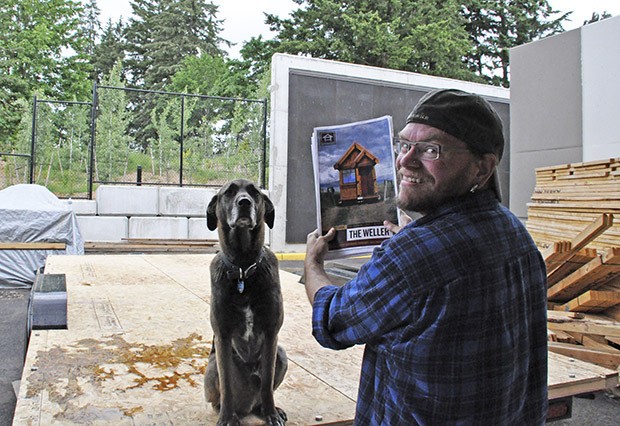When Ryder Patton completes the carpentry program at Green River College in June, he plans to drive the house he’s built to Minnesota and live there.
Using skills acquired in the program, Patton is building a tiny house on an 8-by-20-foot trailer, which he will then be able to transport across the country.
But before he leaves, Patton wants to educate people about the tiny house movement.
That’s why he has put together a Tiny House Showcase from 10 a.m. to 5 p.m., Saturday, June 4, in Green River’s Trades Technology Building at 12401 SE 320th St. in Auburn.
“The point is to establish community here and let people know that we are open to educating them, and it is something they can learn about,” Patton, who is deaf, said through a sign language interpreter. “It is also a great networking opportunity. You can meet new friends who have the same interest in building.”
The showcase will feature a tiny house – which is commonly defined as a 400 square feet or less – for people to tour, workshops on basic carpentry skills, vendors and speakers.
The speakers are: Dee Williams, a tiny house pioneer, who wrote the memoir, “The Big Tiny”; Hannah Crabtree, a tiny house builder/owner from West Seattle; and Andrew Heben, project director for Square One Villages – a tiny house community in Eugene, Ore. – and author of “Tent City Urbanism”.
The diverse backgrounds of the speakers should provide something for everyone, Patton said.
“Some people want to learn how to set up a community,” Patton said. “He (Heben) would be a great person to hear speak for that. Some people want to learn what it is like to live in a house like that full time, or about the different codes and zoning laws related to setting up a tiny-home experience. The other two women would be perfect to listen to about that.”
The Tiny House Showcase is also an opportunity for the carpentry program to show off its new digs, which opened in the fall of 2015.
“We have had some simple open houses here and there over the years, but nothing that was really a feature like this where all types of community people are welcome to attend,” carpentry instructor Glen Martin said.
Martin said he is impressed with the event Patton has organized.
“Almost the first day of the quarter, he already had a business card made up saying, ‘I want to do this’ and I said, ‘You go right ahead. I’ll support you in any way I can,'” Martin said. “He has done a fantastic job. I had no idea it was going to be this scope at all. I expected a tiny house and maybe 30 people showing up is what I envisioned back in the fall. I am really excited to see this happen.”
Desire for a simpler life
After teaching for two years at the Washington School for the Deaf in Vancouver, Patton decided it was time for a change, so last summer he enrolled in the carpentry program at Green River.
Patton, a Virginia native, would like to find a job building tiny houses.
“The long term goal for me is that I could find land one day and establish a community there with other tiny houses and other tiny house owners,” he said.
He became interested in tiny houses as a way to simplify his life.
“I was frustrated with the cost of living,” he said. “I wanted to live a simple life, something that was less materialistic. I wanted to improve my quality of life, and living with less debt, that would be my goal.”
Patton recently started building his own tiny home, which he hopes to complete soon. The house, which he will share with his dog, Lycos, is to include a bathroom, a loft that will serve as a bedroom, a small backroom with a twin-size bed, a kitchen and living space.
Building a tiny house costs about $20,000, while having one constructed starts around $50,000, Patton said.
Green River plans to offer tiny house class
A lot of people have become interested in the tiny house movement in recent years, Martin said.
“Four years ago, I had no idea what a tiny house was,” he said. “I thought it was a shed.”
Martin said he hopes the Tiny House Showcase will be the start of Green River’s involvement in the tiny house movement.
Two years ago, the carpentry program applied for and received a grant to build a tiny house.
“We are working on putting together a tiny house class,” said Sue Z. Hart, a marketing specialist for Green River’s Trades Division. “We hope to start that this summer.”
Martin said he would like to start a tiny house community for homeless people in South King County.
“It would be cool if the college would get involved, be part of developing, whether it be tiny homes on a trailer or tiny homes for the homeless,” he said. “It would be the catalyst that gets that going down here.”
Talk to us
Please share your story tips by emailing editor@kentreporter.com.
To share your opinion for publication, submit a letter through our website https://www.kentreporter.com/submit-letter/. Include your name, address and daytime phone number. (We’ll only publish your name and hometown.) Please keep letters to 300 words or less.

